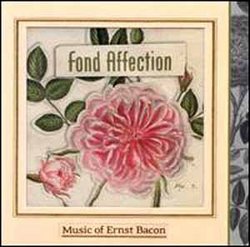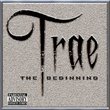| All Artists: Ernst Bacon, Herbert Burtis , William Sharp , Amy Burton , John Musto , Ronald Copes , Alan Feinberg Janet Brown Title: Fond Affection - Works of Ernst Bacon Members Wishing: 0 Total Copies: 0 Label: Composers Recordings Original Release Date: 3/1/2002 Release Date: 3/1/2002 Album Type: Import Genre: Classical Styles: Chamber Music, Historical Periods, Classical (c.1770-1830) Number of Discs: 1 SwapaCD Credits: 1 UPC: 090438089029 |
Search - Ernst Bacon, Herbert Burtis , William Sharp , Amy Burton , John Musto , Ronald Copes , Alan Feinberg Janet Brown :: Fond Affection - Works of Ernst Bacon
 | Ernst Bacon, Herbert Burtis , William Sharp , Amy Burton , John Musto , Ronald Copes , Alan Feinberg Janet Brown Fond Affection - Works of Ernst Bacon Genre: Classical
Ernst Bacon was one of that pioneering generation of composers, along with Thomson, Copland, Harris and others, who found a voice for American music. Born in Chicago on May 26, 1898, his Austrian mother gave him a love of ... more » |
Larger Image |
CD Details
Synopsis
Album Description
Ernst Bacon was one of that pioneering generation of composers, along with Thomson, Copland, Harris and others, who found a voice for American music. Born in Chicago on May 26, 1898, his Austrian mother gave him a love of song and an early start on the piano. Although his varied career included appearances as pianist and conductor, along with teaching and directing positions, his deepest preoccupation was always composing. His musical awards included a Pulitzer Fellowship in 1932 for his Symphony in D Minor and three Guggenheim Fellowships. As a composer, Bacon belonged to no ?school? and followed no fads. He was largely self-taught in composition, except for two years study with Karl Weigl in Vienna in the early ?20s. While there, he experienced the depression of post-war Europe first hand and concluded that the European avant-garde movement, reflecting the pessimism of that era and region, was not appropriate to America. Returning to Chicago, he set out to write music that expressed the vitality and affirmation of our own country. At the age of nineteen, while majoring in mathematics at Northwestern University, Bacon wrote a complex treatise exploring all possible harmonies, which was published by The Open Court Publishing Company (?Our Musical Idiom,? The Monist, October 1917). However, when he began to compose music in his twenties, he rejected a cerebral approach, taking the position that music is an art, not a science. He felt that its source should be intuitive and imaginative, rather than abstract and analytical. From his first job as opera coach at the Eastman School in the mid ?20s, he went on to receive a master?s degree from the University of California at Berkeley and to teach at the San Francisco Conservatory of Music under Ernest Bloch. During the ?30s he was director of the WPA Federal Music Project and Orchestra in San Francisco and was a founder of the Carmel Bach Festival. From 1938 to 1945 he headed the School of Music at Converse College in Spartanburg, South Carolina, where he established the New Spartanburg Music Festival. At Syracuse University, he was director of the School of Music from 1945 to 1947 and composer-in-residence and professor of piano until his retirement in 1963. In 1964 he returned to the West, settling in the small town of Orinda, California, east of the Berkeley hills. Here, as everywhere else, he drew his greatest inspiration from nature, jotting down notes as he explored local trails. His fertile imagination and constant creative efforts left little time for self-promotion, and although nearly blind in old age, he continued to compose until the very end of his ninety-one years. Throughout his long career, Ernst Bacon?s chief aim as a composer was to express the spirit of America in music as Whitman, Emerson, Melville and others had done in literature. He was deeply immersed in our country?s history and folklore, as well as its indigenous music; and was inspired by the poetry, folk songs, jazz rhythms and geography of America as well as the landscape itself?which he hiked, climbed and also painted. All of these elements found their way into his music. Those who influenced Bacon included Carl Sandburg, Thornton Wilder and Roland Hayes. Bacon?s music expresses the common touch and humor of Sandburg; the profound simplicity of Wilder; and the melodic beauty that Roland Hayes expressed so movingly in his singing. As with Schubert, a large body of more than 250 art songs is the heart of an oeuvre that also includes numerous chamber, orchestral and choral works, as well as descriptive pieces for piano. In 1998 numerous vocal-chamber concerts of Bacon?s music were held in honor of his centennial. These events took place at Merkin Concert Hall in New York City; the Longy School of Music in Cambridge, Massachusetts; Coolidge Auditorium at the Library of Congress; the Free Library of Philadelphia; Syracuse, New York; Evanston and Chicago, Illinois; also in Berkeley and Waln
Similar CDs
| Trae The Beginning Genres: Pop, Rap & Hip-Hop Label: Rap-A-Lot (Wea) | |

 Track Listings (17) - Disc #1
Track Listings (17) - Disc #1